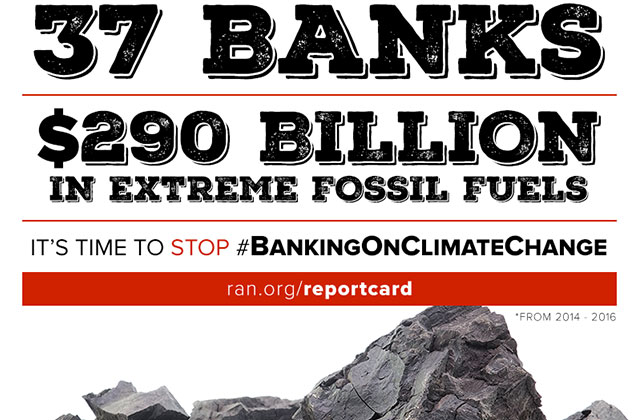The relationship between banks and fossil fuel projects entered the spotlight when Dakota Access Pipeline opponents decided to launched a campaign against banks like Wells Fargo and Bank of America, which fund the project. Now, a report released today (June 21) shows that, in 2016, the world’s biggest banks funneled $87 billion into the fossil fuel industry.
The report, “Banking on Climate Change,” is a joint effort of the Rainforest Action Network, the Sierra Club, BankTrack and Oil Change International.
Last year’s global fossil fuel investment was a 22 percent decrease from the previous year, which saw $111 billion. In 2014, that number was $92 billion. On this, the report says: “While this steep drop in funding is encouraging, it is vital that this be not just a temporary decline, but the start of a rapid phaseout.” The report goes on: “The recent fall in funding for extreme fossil fuels parallels growing public pressure on banks to stay away from these projects and companies.”
This is what the investment looks like for coal power, what is largely considered a dying industry:
{{image:2}}
Still, at this rate of investment, the planet will surpass the warming limit suggested by the Paris Agreement, according to the report. The international agreement states that if the earth’s temperature increases more than 1.5 degrees Celsius, we will see dangerous rises in sea levels and extreme changes in weather patterns.
Some of the banks included in the report are JPMorgan Chase, Citibank and TD Bank. They funded a range of fossil fuel projects, from tar sands oil pipelines to coal mining. The Royal Bank of Canada and JPMorgan Chase were the top investors in Arctic, tar sands and deep offshore drilling from 2014 to 2016.
Here are the banks supporting tar sands oil, which is the type of fuel set to run through the controversial Keystone XL Pipeline:
{{image:3}}
Regarding the 1,172-mile long Dakota Access Pipeline that saw great resistance from Native communities that were concerned about how it would impact their drinking water and land, the report’s press release states:
The report also explores bank failures when it comes to protecting human rights. The most glaring example of this in 2016 was the financing for the Dakota Access Pipeline (DAPL) and the rampant violations of Indigenous rights associated with that project — which triggered an Indigenous-led defund and divest movement that targets banks that finance dirty energy projects.
“The movement standing up to fossil fuel projects wherever they are proposed has gotten so large that these investments are now not only problematic from a climate and human rights perspective, but they’re also risky investments from an economic perspective too,” said David Turnbull, campaigns director at Oil Change International, per the press release. “Our research has shown that any new fossil fuel development runs counter to our climate goals. If banks want to truly be leaders in their field, they need to stop ignoring climate risk and ensure their investments pass the climate test.”
Cities including Seattle and Davis, California, have voted to stop working with banks such as Wells Fargo, a funder of the Dakota Access Pipeline. One bank to announce changes to its policy since this criticism is U.S. Bank, which said in May that it would pull funds from all oil and gas pipeline construction. U.S. Bank is still involved with some fossil fuel companies, including Dominion Energy, a major natural gas provider in America, and Energy Transfer Partners, whose contract, according to 350.org, the bank renewed in March 2017.
